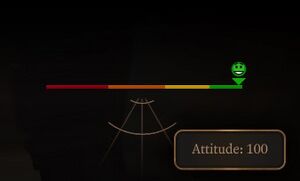Ad placeholder
Attitude: Difference between revisions
m (plural) |
HiddenDragon (talk | contribs) mNo edit summary |
||
| (6 intermediate revisions by 6 users not shown) | |||
| Line 1: | Line 1: | ||
'''Attitude''' is used to determine the hostility of otherwise non-aggressive [[Non-Player Characters]] and the prices they'll accept when trading. Attacking a character, stealing, or interacting with objects without permission may cause a nearby character to lose attitude towards the offending character. The only way to increase attitude is to gift gold or items of value. | {{PageSeo | ||
| description = Attitude is used to determine the hostility of otherwise non-aggressive Non-Player Characters and the prices they'll accept when trading. | |||
| image = Trader attitude.jpg | |||
}} | |||
[[File:Trader attitude.jpg|alt=The meter displaying a trader's Attitude. Hovering over the meter displays the exact amount of Attitude gained.|thumb|{{Noexcerpt|The meter displaying a trader's Attitude. Hovering on the meter displays the exact amount of Attitude gained.}}]] | |||
'''Attitude''' is used to determine the hostility of otherwise non-aggressive [[Non-Player Characters]] and the prices they'll accept when trading. Attacking a character, stealing, or interacting with objects without permission may cause a nearby character to lose attitude towards the offending character. The only way to increase attitude is to gift gold or items of value. | |||
== Maximizing trader attitude == | |||
It can be a good idea to maximize the attitude of certain traders as early in the game as possible, if they reappear in later acts and offer very expensive items. | |||
For a more in-depth description of the effects of attitude on trading, see the page on [[Trading and item pricing]]. | |||
The best way to improve trader attitude seems to be gifting coins rather than items. This is because gifting an item is equivalent to gifting that item's '''current''' sell price. If you reach attitude 100 by gifting coins, then sell the items you would have gifted, you will get better value out of those items. | |||
== Notes == | == Notes == | ||
{{ | * Attitude does not reflect a non-player character's opinion of the active character. | ||
[[Category:Gameplay | * If an offense is committed by a [[Mage Hand]] or [[Familiar]], then the Mage Hand or Familiar will take the attitude loss instead. | ||
{{Gameplay mechanics}} | |||
[[Category:Gameplay mechanics]] | |||
Latest revision as of 16:22, 10 October 2024
Attitude is used to determine the hostility of otherwise non-aggressive Non-Player Characters and the prices they'll accept when trading. Attacking a character, stealing, or interacting with objects without permission may cause a nearby character to lose attitude towards the offending character. The only way to increase attitude is to gift gold or items of value.
Maximizing trader attitude[edit | edit source]
It can be a good idea to maximize the attitude of certain traders as early in the game as possible, if they reappear in later acts and offer very expensive items.
For a more in-depth description of the effects of attitude on trading, see the page on Trading and item pricing.
The best way to improve trader attitude seems to be gifting coins rather than items. This is because gifting an item is equivalent to gifting that item's current sell price. If you reach attitude 100 by gifting coins, then sell the items you would have gifted, you will get better value out of those items.
